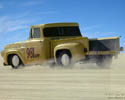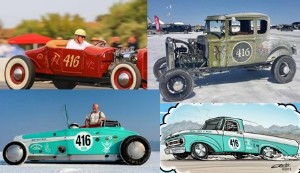|
Author
|
Message
|
|
PF Arcand
|
|
|
Group: Forum Members
Last Active: Last Year
Posts: 3.3K,
Visits: 238.8K
|
With respect to the "corner" in the factory exhaust port outlets. I asked a similar question a short time ago. ( I was referencing off the new heads) Tim has explained what he actually did there, and Hurricane John pointed out to me that heavy grinding of the hump will hit water!
Paul
|
|
|
|
|
Ted
|
|
|
Group: Administrators
Last Active: Yesterday
Posts: 7.5K,
Visits: 205.8K
|
My preference is to leave the hump in the exhaust that’s above the spark plug when porting the Y heads but that’s more for insuring that the casting does not get too thin in that area as a result of grinding. As John originally makes reference to, there’s water under that hump so you’ve got to be cognizant of that when grinding in that area. The FE heads are designed similarly in that it’s easy to hit water in the hump area in the exhaust if trying to remove the hump entirely. For both the Y and the FE, the exhaust flow itself is more highly concentrated at the roof of the port so that’s where the emphasis for exhaust porting work will need to be concentrated. It goes without saying that the headers ports themselves should not be any smaller than the exhaust ports in the heads or have any restrictions present. Here are some pics of various ported exhaust ports.



And here are pictures of the exhaust ports on a set of heads that were run in the late Sixties on a circle track engine and won the series that year. I’ve put them back together just to run a short stint on the dyno to see how they stack up against conventionally ported heads. These particular heads are small letter G heads that had already been angle milled 0.175” and fitted with homemade ‘posts’. CC’ing the heads indicate a 1½ point compression ratio increase in just bolting them on in place of a set of G heads that were flat milled 0.025”.


  Lorena, Texas (South of Waco) Lorena, Texas (South of Waco)
|
|
|
|
|
grovedawg
|
|
|
Group: Forum Members
Last Active: 13 Years Ago
Posts: 246,
Visits: 622
|
Ted (7/1/2010)I’ve put them back together just to run a short stint on the dyno to see how they stack up against conventionally ported heads. What was the result of your dyno testing? Just curious....  Heber City, UT (15 mins outside of Park City- basically it's in the mountains)
Heber City, UT (15 mins outside of Park City- basically it's in the mountains)
55 Effie
|
|
|
|
|
aussiebill
|
|
|
Group: Forum Members
Last Active: 5 Years Ago
Posts: 1.8K,
Visits: 11.4K
|
grovedawg (7/1/2010)
Ted (7/1/2010)I’ve put them back together just to run a short stint on the dyno to see how they stack up against conventionally ported heads. What was the result of your dyno testing? Just curious....  Ted, probably in the early 70,s i ported heads with the round port theory and cant remember the results but looked good, but there are few heads made with round ports, the D theory port has proven itself in most applications, but those ones with the angled mill job should perform well for constant high RPM range. On another part of these theorys, i have heads with the intake port runners removed as far as can be done, again for constant high rpm use. Thankfully we have the benefit of your time and interest to dyno these varying modifications and form a baseline list of improvements to aim straight off with. We all sit watching these results and are thankfull for your enthusiam. regards bill.
 AussieBill YYYY Forever Y Block YYYY AussieBill YYYY Forever Y Block YYYY Down Under, Australia
|
|
|
|
|
57FordPU
|
|
|
Group: Forum Members
Last Active: 3 Years Ago
Posts: 726,
Visits: 73.6K
|
I realize this is an exhaust port thread, but I have an interest in what Aussie Bill mentioned. I read in a previous Yestertech article by Jerry C in Y-Block Magazine that removing the runner separation in the head did just what you said, it worked better at the top end, but at the expense of low end torque. Of course that peaked my interest because that is mostly what I am interested in. Bill, do you remember any performance details when removing the runner separation? I have recently talked to Jerry and he suggests that I start with no runner separation in the intake adaptors, but leave the head runner separation with a good radius on the leading edge. Then later, try removing the separation in the heads for a comparison. Any thoughts? (Sometimes Tim just shakes his head at me  ) If the forum moderators feel like this should be moved to a sperate thread please feel free to do so.
Charlie Burns Laton, Ca (South of Fresno)

BurnsRacing981@gmail.com
|
|
|
|
|
mctim64
|
|
|
Group: Forum Members
Last Active: 6 Years Ago
Posts: 2.4K,
Visits: 5.0K
|
Charlie, I always listen to your ideas. 
 God Bless. God Bless.  Tim http://yblockguy.com/ Tim http://yblockguy.com/
350ci Y-Block FED "Elwood", 301ci Y-Block Unibody LSR "Jake", 312ci Y-Block '58 F-100, 338ci Y-Block powered Model A Tudor
tim@yblockguy.com Visalia, California Just west of the Sequoias
|
|
|
|
|
aussiebill
|
|
|
Group: Forum Members
Last Active: 5 Years Ago
Posts: 1.8K,
Visits: 11.4K
|
57FordPU (7/1/2010)
I realize this is an exhaust port thread, but I have an interest in what Aussie Bill mentioned. I read in a previous Yestertech article by Jerry C in Y-Block Magazine that removing the runner separation in the head did just what you said, it worked better at the top end, but at the expense of low end torque. Of course that peaked my interest because that is mostly what I am interested in. Bill, do you remember any performance details when removing the runner separation? I have recently talked to Jerry and he suggests that I start with no runner separation in the intake adaptors, but leave the head runner separation with a good radius on the leading edge. Then later, try removing the separation in the heads for a comparison. Any thoughts? (Sometimes Tim just shakes his head at me  ) If the forum moderators feel like this should be moved to a sperate thread please feel free to do so. Hi charlie, it was so long ago i cant remember, actually yesterday is a chore also, but those heads were run on speed boat along with Cain open runner intake and basically pedal to floor all the way, in those days everything was a "lets try this and see what happens" . I agree with jerry on trying a bit at a time with that idea and note the improvements, nowadays things can be measured and comparisons drawn, i,m sure ted might relate to possible results from this type of head mod. best regards bill.
 AussieBill YYYY Forever Y Block YYYY AussieBill YYYY Forever Y Block YYYY Down Under, Australia
|
|
|
|
|
Ted
|
|
|
Group: Administrators
Last Active: Yesterday
Posts: 7.5K,
Visits: 205.8K
|
grovedawg (7/1/2010)
Ted (7/1/2010)I’ve put them back together just to run a short stint on the dyno to see how they stack up against conventionally ported heads. What was the result of your dyno testing? Just curious....  Those heads are currently sitting on the dyno engine awaiting a break in shop activities so the engine can be put back on the dyno. Probably in a couple of weeks the way things look right now. Two sets of ported heads will be tested back to back on the same day when it does happen. The second set of ported heads (more conventional porting) will be used for the exhaust and header tests.
  Lorena, Texas (South of Waco) Lorena, Texas (South of Waco)
|
|
|
|
|
Ted
|
|
|
Group: Administrators
Last Active: Yesterday
Posts: 7.5K,
Visits: 205.8K
|
57FordPU (7/1/2010)
...I read in a previous Yestertech article by Jerry C in Y-Block Magazine that removing the runner separation in the head did just what you said, it worked better at the top end, but at the expense of low end torque. Of course that peaked my interest because that is mostly what I am interested in. Bill, do you remember any performance details when removing the runner separation? I have recently talked to Jerry and he suggests that I start with no runner separation in the intake adaptors, but leave the head runner separation with a good radius on the leading edge. Then later, try removing the separation in the heads for a comparison. Any thoughts? (Sometimes Tim just shakes his head at me ) ) The Cain intake manifold is completely runnerless; both at the carb flange and the ports. Testing on two different engines has this particular intake design down on both torque and horsepower as compared to modern dual plane intake manifolds (Mummert and Blue Thunder). This testing gives an idea of what the horsepower and torque does if removing the dividers from an intake that originally had divided ports. Removing the dividers in the heads should have similar results as removing the dividers from the intakes. I have heard the stories of the dividers being removed in the heads and lowend performance always suffered but performance above 5000 rpms tries to come back. Based on what I saw with the Cain intake testing, topend performance is still going to be weaker with the runners being removed than with a good modified stock intake or an aftermarket manifold. Here are a couple of past threads showing dyno results on two different engines with the runnerless design Cain intake manifold. http://forums.y-blocksforever.com/Topic29068.aspx http://forums.y-blocksforever.com/Topic46008.aspx
  Lorena, Texas (South of Waco) Lorena, Texas (South of Waco)
|
|
|
|
|
Doug T
|
|
|
Group: Forum Members
Last Active: 2 Months Ago
Posts: 563,
Visits: 2.6K
|
Re Exhaust porting, I don't think there is much disagreement to the idea that the exhaust port is undersized in the G heads. I.60"dia exhaust valves are definitely a help. For porting my preference is to do it like the old heads that Ted has pictured so well: that is with an arched or curved roof. Flow testing on a bench will show that a flat roof will flow more but in all instances there needs to be a square to round transition for the header tube some place between the flange of such a port and the tube that will speed up the flow causing an increase pressure. I like very smooooth flow paths with a flow reversion as the only change in cross section until well beyond the exhaust flange. Therefore I make the transition as part of the port itself. In any case be sure to use the proper safety goggles when you start to port the intake side! 
Doug T
The Highlands, Louisville, Ky. 
|
|
|
|